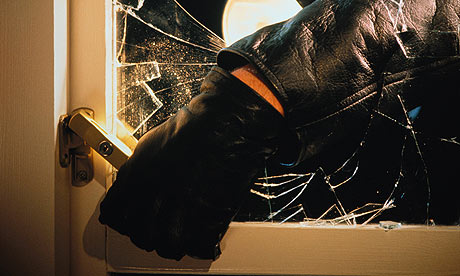When burglarizing a home becomes difficult, hardened criminals often look for
other ways to steal.
This can lead to crimes, such as personal assault, purse snatching and home invasion.
Below are some general security tips to help you better protect yourself and your family at home and away, as well as some tips on
staying safe in your car.
Unfortunately, many burglaries happen while someone is at home.
A simple thing like leaving an outside door open while you run over to a neighbor’s house can give an intruder just enough time to get in.
So always keep your doors and windows locked.
A few things to remember:
Don’t enter your home
if you see signs of forced entry.
Go to a neighbor’s house,
call the police and note the description of any strange cars or people near your home.
If you detect an intruder, don’t confront them. Panic can sometimes turn a burglary
into a more dangerous crime.
If a stranger wants to use your phone, don’t let them inside. If they say they have an emergency such as their car breaking down, take down the details with your security door closed
and make the call for them.
Never tell a stranger you are home alone.
All representatives of legitimate companies have ID cards. If you’re even a little bit unsure about a person at your front door, write down their ID or badge number and make sure you lock the door before calling their company for verification.
If you get a harassing phone call, say nothing and hang up the phone immediately. If you keep getting them,
call the police and your telephone company.
Also consider installing an answering machine or caller ID unit so you can screen your calls
before you answer them.
Taking a few extra precautions while you’re away from home can help you avoid problems.
A simple thing such as making sure your car doors are locked can keep someone from jumping inside.
If you carry a purse,
keep it close to your body at all times.
If you have a wallet, keep it in an inside jacket pocket or front pocket.
Try not to carry more cash than you need.
If someone grabs your purse or wallet,
don’t fight or run after them.
No amount of money is worth getting hurt over.
If you ride the bus, train or subway, be aware of their schedules so you don’t have to wait any longer than necessary at a bus stop
or train station.
On a train, choose a seat near the conductor.
On a bus, sit near the driver.
If a friend or taxi driver takes you home,
ask them to wait until you’re safely inside.
Don’t cross the road from between parked cars or in front of a bus because that can make it hard for other drivers to see you.
Don’t walk in isolated places at night.
If you have to, wear light-colored clothing and carry a flashlight.
You may also want to carry a personal alarm siren or pepper spray.
(Please consult local and state laws and regulations on personal defense sprays.)
If someone tries to grab you,
yell “FIRE!”
because this gets more attention than shouting “Help!”
If you think you’re being followed, turn around to see if someone’s there instead of being taken by surprise.
Walk to the nearest store or office where there are other people around and let someone know you’re being followed.
If you take money out of an ATM,
choose a machine in a well-lit location.
Always lock your vehicle.
Don’t leave your keys in the ignition.
Hide any valuables in the trunk
or the glove compartment.
Seeing something valuable on a seat may tempt someone to break in.
Avoid driving down deserted roads.
If you do break down in an isolated spot,
put your hood up,
get back inside and keep your doors locked.
Wait for a police car or other emergency vehicle to stop and help.
Don’t leave your vehicle to go with strangers—even if they are a couple.
Don’t pick up hitchhikers.
When you park on the street,
put the emergency brake on and turn the steering wheel toward the curb to lock the steering column.
When walking up to your car or front door,
have your key ready and out in your hand.
Before you get into your car,
check the back seat.
If you’re traveling alone, close the windows and lock the doors at all times.
Don’t put identification tags with your name and address on your keys or key ring.
Think about a lockable gas cap if you don’t already have one.
Many criminals simply steal a car for a joy ride.
If you have a gas cap, they’ll be forced to abandon the car when it runs out of fuel.
When you have your car repaired
or leave it with a valet,
take your house keys off your key ring to prevent them from being copied.
Make sure to carry your cellular phone with you to use during emergency situations.
However, it is advised not to use your phone while operating a vehicle as this can present a danger to yourself and other motorists.
Sharing Is Caring....










